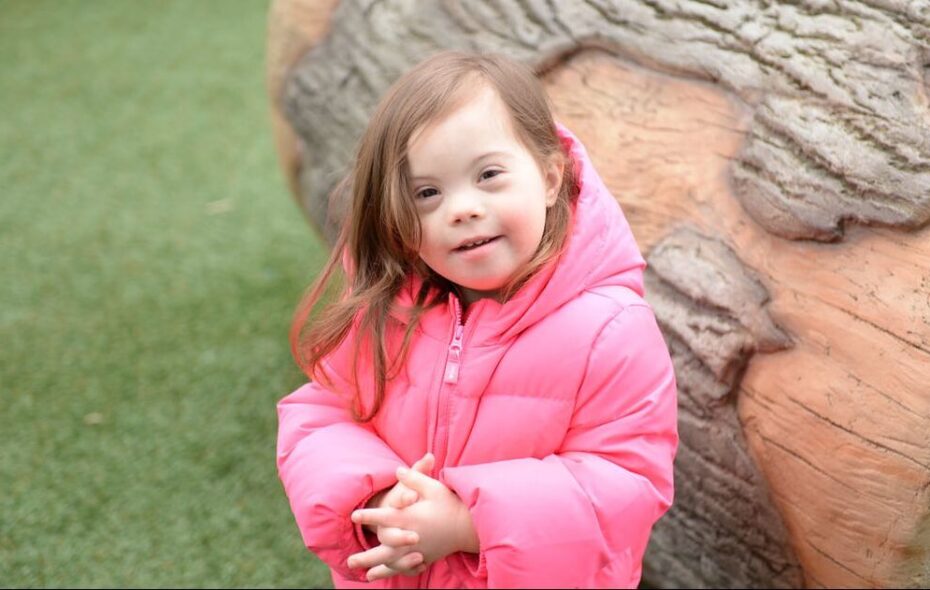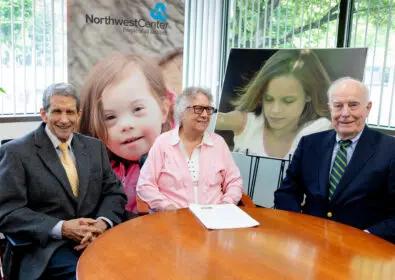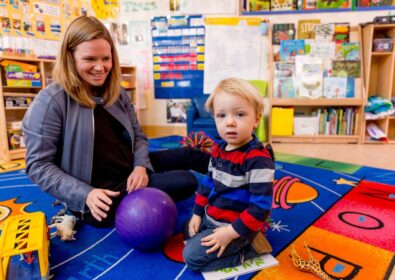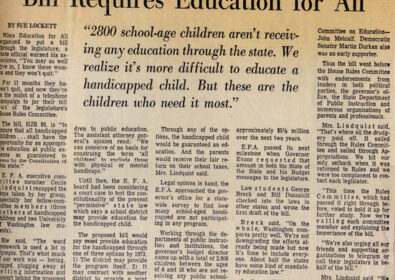

Kids | Written By Northwest Center Staff
She’s Got This! Catching Up With Onna, From Nwc Kids To Fully Included Third-grader

Onna captured hearts in 2015 during Northwest Center’s 50th anniversary. With her little pink coat and impish smile, the “Dancing Iron Baby” (a nickname from her parents, inspired by Onna’s joy and strength) was featured on Northwest Center anniversary ad campaigns. Five years later, Northwest Center is celebrating our 55th anniversary year, and Onna is now attending third grade where she is fully included with kids of all abilities, and still “dancing through life,” according to her mom Marija. Here’s what Marija had to say:
Q: Do you still call Onna the Dancing Iron Baby?
A: Oh no, we are not allowed to call Onna a baby any longer! Those are clear orders from the boss herself! She is no baby now and won’t let anyone call her anything other than by her first name. But she still dances through this life with such determination and pride, despite the systemic and structural barriers she experiences on a daily basis.
Q: How has Onna met or surpassed your expectations for her when she was a baby, when she was at NWC Kids, and now?
A: Onna has always been Onna, and that she will continue to be—disabled and fully proud of her disability as part of her identity, culture, and community. And we fully embrace and celebrate everything that she is. The only thing I’d say has changed over the years are my own expectations—not towards her, but towards society.
When you start this journey, you are surrounded by well-intentioned people trying to help “fix” your kid or teach her how to mask her disability and to make her appear as indistinguishable and as “normal” as possible so that she “fits in.” But imagine a life of never being accepted for everything that you are, for your humanity; always having your membership in the society conditional on how well you “fit in,” how much you appear to be “normal.” People with disabilities are valuable and worthy members of our society just as they are.
While there exists a lot of discrimination and barriers for disabled folks, those are the fault of society, not inherent in anyone’s impairments. So, it is not Onna and those like her that need fixing, but it is our society that needs to be fixed and step up to ensure access, inclusion and equitable opportunities in life, and full membership of all individuals.
Every step toward a more inclusive world is a step toward a better world. So yes, we expect and demand this societal change, and we teach Onna that she unapologetically demands her membership in this world.
Q: How have things changed since you had your little boy? What is their relationship like?
A: Onna is a very empathetic child and finds it challenging when others are crying and upset. And we all know how much babies cry! So it took some time for Onna to get used to a baby in the house. But her brother Corbijn is a big boy now and they have a wonderful relationship. They are great support for each other and look out for each other. Occasionally, we may have difficulty in understanding what Onna is communicating to us, but her brother always understands her perfectly.
Q: Do you still call Onna the Dancing Iron Baby?
A: Oh no, we are not allowed to call Onna a baby any longer! Those are clear orders from the boss herself! She is no baby now and won’t let anyone call her anything other than by her first name. But she still dances through this life with such determination and pride, despite the systemic and structural barriers she experiences on a daily basis.
Q: How has Onna met or surpassed your expectations for her when she was a baby, when she was at NWC Kids, and now?
A: Onna has always been Onna, and that she will continue to be—disabled and fully proud of her disability as part of her identity, culture, and community. And we fully embrace and celebrate everything that she is. The only thing I’d say has changed over the years are my own expectations—not towards her, but towards society.
When you start this journey, you are surrounded by well-intentioned people trying to help “fix” your kid or teach her how to mask her disability and to make her appear as indistinguishable and as “normal” as possible so that she “fits in.” But imagine a life of never being accepted for everything that you are, for your humanity; always having your membership in the society conditional on how well you “fit in,” how much you appear to be “normal.” People with disabilities are valuable and worthy members of our society just as they are.
While there exists a lot of discrimination and barriers for disabled folks, those are the fault of society, not inherent in anyone’s impairments. So, it is not Onna and those like her that need fixing, but it is our society that needs to be fixed and step up to ensure access, inclusion and equitable opportunities in life, and full membership of all individuals.
Every step toward a more inclusive world is a step toward a better world. So yes, we expect and demand this societal change, and we teach Onna that she unapologetically demands her membership in this world.
Q: How have things changed since you had your little boy? What is their relationship like?
A: Onna is a very empathetic child and finds it challenging when others are crying and upset. And we all know how much babies cry! So it took some time for Onna to get used to a baby in the house. But her brother Corbijn is a big boy now and they have a wonderful relationship. They are great support for each other and look out for each other. Occasionally, we may have difficulty in understanding what Onna is communicating to us, but her brother always understands her perfectly.

Q: What makes inclusive early learning so important for kids of any ability?
A: Having Onna attend inclusive early learning at Northwest Center Kids has had myriad benefits, and not just for Onna. For one, it set a precedent for Onna’s further inclusive education. She is now in third grade and has always been fully included in a general education classroom setting. For us, the conversation with schools has always been, “Onna is going to be included in a general education class with her peers, so what do we have to do to make it work?”
Both Onna and her NWC peers experienced and learned about valuing and respecting diversity and equity, understanding that Onna fully belongs. They were given opportunities to learn about each other and build relationships with one another. They all learned to expect and welcome kids like Onna in their classrooms and their communities. They all developed a sense of belonging in a very diverse society. And hopefully they all learned that separate is not equal or equitable.
There is over 40 years of research evidence that overwhelmingly tells us that inclusive education, regardless of type or severity of disability, results in better academic and social outcomes for all (disabled and non-disabled) children. It’s a win-win situation for everyone.
We also know and value that inclusive education is essential not only because the research says so, but also because we believe in and fight for social justice, human rights, and equity for all our fellow humans. And, above all, we listen to Onna and the disabled community and to what they need. They do not fight for segregation; they want inclusion. Inclusive education equates to inclusive society from birth through life.
Equitable opportunities are being built (or not) from that first day in early education. Will they be part of the diversity the mainstream society is and understand that they have a place with their peers and that they belong and are perceived as being valued? Or will they be kept on the outskirts of society and educated separately because they are “too special”? Will they grow up with their non-disabled peers who will potentially become their friends, interview them for work one day, and who will become great humans because they truly understand diversity and recognize value in it?
We cannot ask for our kids with disabilities to have an equitable space in this society and yet ask to have them hidden in those separate classrooms with special services that actually show no benefits to our kids, their peers, or the overall society.
In short, inclusive education makes us all become better humans by learning together.
Q: How old is Onna now? What does she love to do?
A: Onna is nine years old now. She is in third grade and included in general education 100% of the time. She loves anything to do with swimming and mermaids, so her summers are spent mostly in the water. She’s an avid little chef and her specialty is breakfast—she makes delicious scrambled eggs and pancakes. Until recently (pre-COVID time), Onna was attending weekly swimming, horse-riding, and martial arts classes. She’s a little powerhouse and is very clear about her wants and needs. Most of the time now I am told, “Mom, I’ve got this!” And she really does—she’s got this!
Q: What do you wish people understood about being a parent of a child with a disability?
A: Life can be challenging for Onna sometimes, but I want to make it clear that it is not because of her disability, but because society was built without really considering Onna in the planning. And as they say, it takes a village. And it really does take a village to create an inclusive society. It is everyone’s responsibility. We as a society need to take ownership of this and work on creating a society that is equitable and inclusive of all its members.
Q: What are your hopes and dreams for Onna?
A: Our vision for Onna is for her to live a life with a sense of belonging, mastery, independence, and generosity. To live her adulthood as independently as she chooses. To attend college and pursue her career of choice. In other words, to live a fulfilling life.
We also envision her finding long-term companionship and love with a significant other, and getting married if she chooses to do so. She will see herself living with her disability as a source of pride and joy and understand her self-worth. She will be a strong advocate for herself and the disabled community. She will continue to be known for her empathy, generosity, kindness, grace, and sense of humor. She will live a life of which she will be proud and happy.
A: Having Onna attend inclusive early learning at Northwest Center Kids has had myriad benefits, and not just for Onna. For one, it set a precedent for Onna’s further inclusive education. She is now in third grade and has always been fully included in a general education classroom setting. For us, the conversation with schools has always been, “Onna is going to be included in a general education class with her peers, so what do we have to do to make it work?”
Both Onna and her NWC peers experienced and learned about valuing and respecting diversity and equity, understanding that Onna fully belongs. They were given opportunities to learn about each other and build relationships with one another. They all learned to expect and welcome kids like Onna in their classrooms and their communities. They all developed a sense of belonging in a very diverse society. And hopefully they all learned that separate is not equal or equitable.
There is over 40 years of research evidence that overwhelmingly tells us that inclusive education, regardless of type or severity of disability, results in better academic and social outcomes for all (disabled and non-disabled) children. It’s a win-win situation for everyone.
We also know and value that inclusive education is essential not only because the research says so, but also because we believe in and fight for social justice, human rights, and equity for all our fellow humans. And, above all, we listen to Onna and the disabled community and to what they need. They do not fight for segregation; they want inclusion. Inclusive education equates to inclusive society from birth through life.
Equitable opportunities are being built (or not) from that first day in early education. Will they be part of the diversity the mainstream society is and understand that they have a place with their peers and that they belong and are perceived as being valued? Or will they be kept on the outskirts of society and educated separately because they are “too special”? Will they grow up with their non-disabled peers who will potentially become their friends, interview them for work one day, and who will become great humans because they truly understand diversity and recognize value in it?
We cannot ask for our kids with disabilities to have an equitable space in this society and yet ask to have them hidden in those separate classrooms with special services that actually show no benefits to our kids, their peers, or the overall society.
In short, inclusive education makes us all become better humans by learning together.
Q: How old is Onna now? What does she love to do?
A: Onna is nine years old now. She is in third grade and included in general education 100% of the time. She loves anything to do with swimming and mermaids, so her summers are spent mostly in the water. She’s an avid little chef and her specialty is breakfast—she makes delicious scrambled eggs and pancakes. Until recently (pre-COVID time), Onna was attending weekly swimming, horse-riding, and martial arts classes. She’s a little powerhouse and is very clear about her wants and needs. Most of the time now I am told, “Mom, I’ve got this!” And she really does—she’s got this!
Q: What do you wish people understood about being a parent of a child with a disability?
A: Life can be challenging for Onna sometimes, but I want to make it clear that it is not because of her disability, but because society was built without really considering Onna in the planning. And as they say, it takes a village. And it really does take a village to create an inclusive society. It is everyone’s responsibility. We as a society need to take ownership of this and work on creating a society that is equitable and inclusive of all its members.
Q: What are your hopes and dreams for Onna?
A: Our vision for Onna is for her to live a life with a sense of belonging, mastery, independence, and generosity. To live her adulthood as independently as she chooses. To attend college and pursue her career of choice. In other words, to live a fulfilling life.
We also envision her finding long-term companionship and love with a significant other, and getting married if she chooses to do so. She will see herself living with her disability as a source of pride and joy and understand her self-worth. She will be a strong advocate for herself and the disabled community. She will continue to be known for her empathy, generosity, kindness, grace, and sense of humor. She will live a life of which she will be proud and happy.


